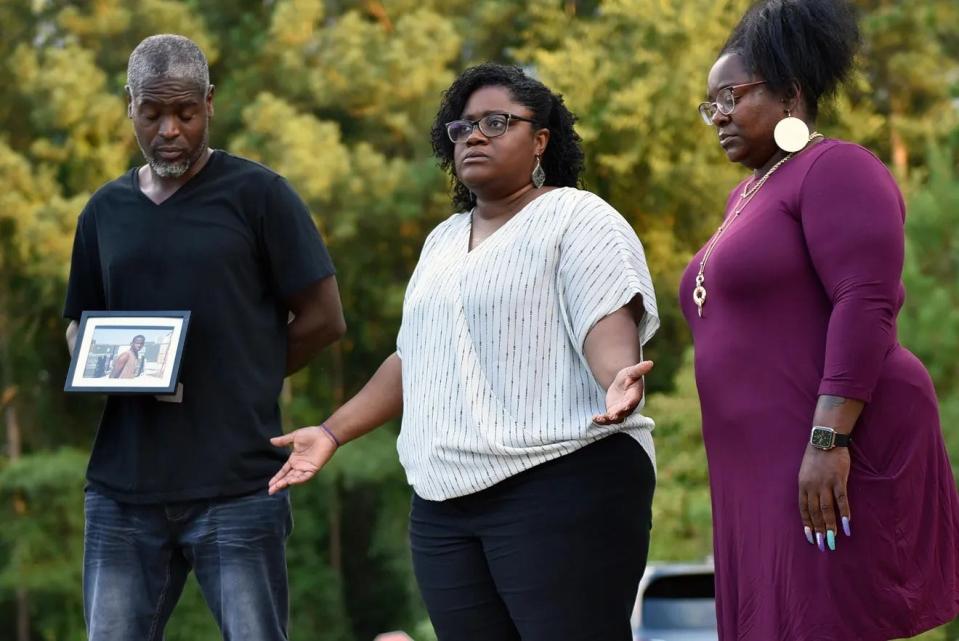Here's the latest in a lawsuit over a Cumberland County deputy's fatal shooting of a veteran
Motions were filed last week on behalf of Cumberland County Sheriff Ennis Wright and Deputy Justin Evans, the latter of whom shot and killed a veteran at his Fayetteville home on Aug. 18, 2020.
Complainant Sabara Fisher-Roberts says her husband, veteran Adrian Roberts, suffered from post-traumatic stress disorder and other mental impairments when he was shot and killed by Cumberland County deputies in his Summerfield Lane home.
Adrian Roberts' widow filed the wrongful death lawsuit on Sept. 3, 2021.
Cumberland County Sheriff’s Office attorney Ronnie Mitchell filed Feb. 20 motions requesting summary judgment in the case, instead of a trial jury.

What the Sheriff's Office says happened
In the defense motion, officials said Cumberland County deputies, including Evans, attempted to serve an involuntary commitment order on Adrian Roberts when Roberts attacked them with a machete.
In response, Evans discharged his weapon, resulting in Roberts’ death, the motion stated.
The motion states that at 10 a.m. the day of the shooting, a mental health care professional with Therapeutic Alternative Mobile Crisis went to Roberts’ home to conduct a wellness check on him and was accompanied by deputies.
“Roberts was extremely paranoid and threatening, believing the state and federal governments were spying on and planning to attack him and that neighborhood children were disguised assassins,” the mental health professional told authorities.
The mental health professional told deputies that she believed Roberts was “in a mental health crisis, was not taking his medications, was schizophrenic, bipolar, and in a state of paranoia,” the motion states.
She told authorities that Roberts had machetes, knives, and daggers in his home and kept them within reach.
The motion states that when the mental health professional and deputies arrived at Roberts’ home, he told them he did not want them on his property and was fine.
The motion states that the deputies told Roberts the mental health professional employee was there to help and that he made “sexually aggressive comments,” toward her, causing her to become frightened and think Roberts “really seemed like he was out of it.”
The motion states that the deputies were trained in crisis intervention techniques and attempted to de-escalate the situation but were unable to persuade Roberts to accept mental health help and left.
The mental health professional called Roberts' wife to tell her what happened, and Sabrina Roberts allegedly told the professional that her husband was diagnosed with post-traumatic stress disorder and schizoaffective disorder and she was afraid of him.
The motion states that the professional provided Sabrina Roberts with information about an involuntary commitment order for her husband, and the magistrate who issued the order and took Sabrina Roberts’ testimony noted that Sabrina Roberts said her husband was paranoid that government officials were monitoring him and armed himself with throwing knives, mace and a machete.
The order directed any law enforcement officer to take Roberts into custody within the next 24 hours for examination.
The motion states that the captain who was responsible for serving the orders spoke to Sabrina Roberts, who allegedly told him she was afraid her husband would harm her and her children.
The motion states the captain was “mindful” of Sheriff Wright’s policy that prohibits discrimination, particularly against persons with disabilities. Wright also requires deputies who completed crisis intervention to be the ones who respond to crises.
The motion states the captain asked two deputies who responded to Roberts’ home earlier that day to go back to the home in an attempt to persuade Roberts to get treatment.
The CCSO Special Response Team, which has crisis intervention training and certifications, was also asked to assist, the motion states.
The motion states Roberts “became irate, refused to come outside and ordered them to leave,” when the captain told him he and the deputies were there for a wellness check.
The motion states that the captain and deputies moved their patrol cars to appear as if they were leaving, while the special response team was asked to breach the home if Roberts did not come outside.
The captain and deputies made a second attempt to get Roberts to come out, but Roberts became “more agitated,” the motion states.
When the special response team used a tool to breach the door, the motions claim, Roberts moved toward the team “with a machete in his right hand raised above his head and over the head of Deputies, preparing to strike and attempt to cause serious and potentially fatal injury."
The motion states that Evans felt he and a corporal were in danger and fired his weapon.
Defense
The motion, filed on behalf of the Sheriff’s Office, states that Sabrina Roberts’ allegations that her husband was discriminated against because of his mental disability are unfounded because Wright’s policies prohibit discrimination against people with disabilities and he requires deputies to receive crisis intervention training.
The motion states that deputies attempted to de-escalate the situation by speaking to their supervisors, the mental health professional and Sabrina Roberts, and did not violate Adrian Roberts’ rights.
The motion further states that the defendants are protected under qualified immunity, which “shields” law enforcement officers from legal recourse when acting in an official capacity.
“The deputies were obligated to assure themselves that no threat existed against them, [Roberts’s] children, or anyone else,” the motion states.
The motion states that Roberts :
• Refused to accept help.
• Increased aggressiveness over the 45-minute to one-hour time frame that the deputies attempted to reason with him
• Attempted to kill the two deputies who breached the door.
The motion further states that Sabrina Roberts’ complaint fails to show that Wright knew his subordinates were engaged in behaviors that posed an “unreasonable risk,” to Roberts.
The defense also filed a motion seeking to seal documents related to “confidential, protected information,” in Roberts’ protective orders and State Bureau of Investigation records of the incident, which includes Roberts’ mental health records.
Wife's complaint
Sabrina Roberts' lawsuit states that the department failed "to provide reasonable accommodations” for Roberts when attempting to serve the involuntary commitment order.

More: Defense seeks dismissal of suit filed by wife of Fayetteville vet shot, killed by deputies
“As a result of the failure to provide reasonable accommodations, Adrian Roberts suffered greater injuries than other individuals taken into custody, specifically he was killed,” the suit says.
Sabrina Roberts' complaint says her husband enlisted in the Army in 2001 and suffered from a head injury while deployed to Iraq from 2003 to 2004. He was honorably discharged on June 3, 2005.
The lawsuit says Roberts sought treatment in February 2012 and was diagnosed with post-traumatic stress disorder and a psychotic disorder by the Veteran’s Affairs. Two years later, he was diagnosed with schizoaffective disorder, auditory hallucinations, bipolar disorder and depression, according to the complaint.
The lawsuit says that he continued regular treatment at the VA through 2019 and the first half of 2020.
The suit states that Sabrina Roberts sought help when her husband’s mental health deteriorated, but deputies “embarked on a willful, malicious, reckless, and outrageous course of conduct that was intended to cause and, in fact, caused Roberts to suffer extreme and severe mental and emotional distress, anxiety, terror and agony, and ultimately death.”
Staff writer Rachael Riley can be reached at rriley@fayobserver.com or 910-486-3528.
This article originally appeared on The Fayetteville Observer: Latest in wrongful death lawsuit against Cumberland County Sheriff

